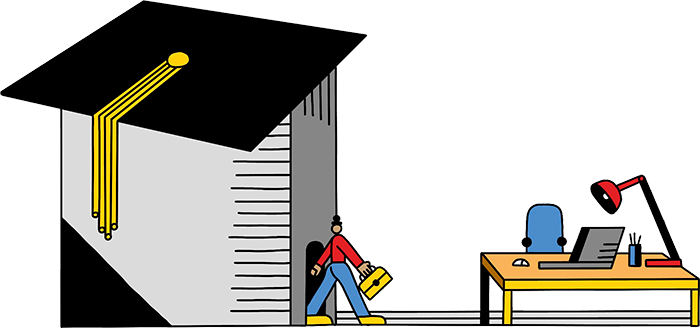News
The Right Stuff
November 17, 2021
From providing entry-level training programs for the under- and unemployed to offering advanced certifications for those with graduate degrees, New York Tech is meeting employer needs with a skilled and inclusive workforce.

As an undergraduate studying architecture, it’s not the norm to be designing custom millwork for a New York City penthouse apartment. But that’s just what fourth-year New York Tech architecture student Julia Andor is doing, in collaboration with Maria Di Natale (B.Arch. ’88), senior architect and assistant studio director at H2M architects + engineers and an adjunct professor of architecture at New York Tech.
The joint project evolved out of their relationship, forged through New York Tech’s Women’s Technology Council (WTC) mentoring program. The WTC is a group of successful women in tech fields organized to support female students, alumni, faculty, and staff in advancing their careers, assuming leadership positions, and building an inclusive and diverse workforce. In February, the WTC launched a mentoring program to further support and guide students in science, technology, engineering, and math (STEM) fields from college to career.
“Our degree programs put students on the road to a profession, but the classroom doesn’t provide all of the skills, guidance, and networking that it takes to be a successful professional,” says Nada Anid,* Ph.D., New York Tech’s vice president for strategic communications and external affairs and the driving force behind the WTC, along with Catherine A. Allen, member of New York Tech’s Board of Trustees. “It’s particularly important for women because they are in the minority in STEM fields. They’re usually the only one in the meeting room, and they need that extra support.”
“I always knew I wanted to be an architect, but I wasn’t really sure where to go with it,” says Andor. “Maria has been very helpful in providing me direction. She’s helped me look for jobs she thought would foster my interests and spent almost a month helping me with an application for a fellowship program.”
“Our goal is that through these programs and our successful female alumni, our female students get a feel for what the workplace in tech is like, the hurdles these women have faced, and how they climbed the echelons in their careers,” says Anid.
Industry Partnerships

Workforce development is a catchall term to describe efforts to boost employee skills to meet industry needs—whether that’s the development of soft skills, new certifications for working professionals, or entry-level job training for low-skilled workers or the underemployed.
And workforce needs are continually changing, fueled by technological developments, automation, medical advances, and, particularly since the COVID-19 pandemic, changes in how and where employees perform their work.
As a university focused on career-oriented education, investing in workforce development initiatives is a natural extension for New York Tech, both to support students and alumni and the economic success of the region.
“Fields are changing very rapidly, and it’s important to stay on top of things like new coding languages and certifications emerging from all directions to determine what’s most relevant,” says Junius Gonzales, M.D., M.B.A., provost and vice president for academic affairs. “In preparing students at both the undergraduate and graduate level, we’re looking strategically at what students want and what the workforce and employer sector are asking for.”
What better way to provide this training than through industry partnerships? Zscaler provides cutting-edge cybersecurity for cloud computing and offers a series of online courses on zero-trust cloud services, leading to an industry-recognized certificate in cloud security skills. Through a unique partnership, the College of Engineering and Computing Sciences is offering these courses at no charge to anyone with a New York Tech email account—students, alumni, faculty, or staff.
“The first benefit is that they can take these courses for free,” says Babak Beheshti, Ph.D., dean of the College of Engineering and Computing Sciences. “Having the certification is going to be a great item on the résumé for students heading into the job market or for our alumni who may be looking into a career shift or upskilling.”
But computer science students may get an extra benefit—passing the certification test can provide three credit hours toward their graduation requirements, reducing their overall course and tuition load and improving the affordability of their degree.
According to Beheshti, “The Zscaler training is not a one-off but part of a holistic effort.” The College of Engineering and Computing Sciences is strategically looking for partnerships at the college level to provide professional skills training and certification to students and alumni.
Gonzales endorses the expansion of partnerships. “This is a way to add to our curriculum without replacing courses or having to invest in additional faculty,” he says.
“In preparing students at both the undergraduate and graduate level, we’re looking strategically at what students want and what the workforce and employer sector are asking for.”
Junius Gonzales, M.D., M.B.A., provost and vice president for academic affairs
Grants to Enhance Skills
But New York Tech’s efforts extend beyond students pursuing its career-focused professional degrees. The university sponsors numerous skills training and certificate programs to diverse populations in the wider community, many supported through grants.
Working with the organization Girls Who Code, the College of Engineering and Computing Sciences launched a Python programming workshop in April designed specifically for women and single parents, a target audience disproportionately impacted by COVID-19 and the market downturn. “We wanted to provide a gateway, however modest, into the STEM fields and decided that a basic fundamental understanding of programming would open up a lot of doors,” says Beheshti.
The six-week course met virtually twice a week, with a third session available with a teaching assistant for questions and review. The course was designed for people with zero background in any technical area and received rave reviews from participants.
Karissa Garner saw a notice for the course in a newsletter for an after-school program her 15-year-old son participated in. “Being home during the pandemic, the time frame was just right to try and learn something new. I would like my son to get interested in tech and thought it would be good for him to see me trying something that’s completely different from what I studied,” she says.
Garner says the course was very well crafted, and the fact that it was geared toward women made it less intimidating for her. “Amy Bravo, senior director of career success and experiential education, was just amazing in showing different things we can work on to go further, so I do plan to try to see what comes next from this,” she says. Another participant, Angela Harris, also took advantage of the course as a productive activity during the COVID-19 shutdown.
Harris previously participated in a commercial energy auditing training run by New York Tech in conjunction with the Willdan Group through a $250,000 grant from the New York State Energy Research and Development Authority (NYSERDA) at The Pillars in Harlem in New York City. “This is another industry partnership, training both the existing workforce and new students in the growing area of energy efficiency,” says Gonzales. “The course was very intense due to the amount of material we had to cover in five weeks and the weekly testing,” says Harris. Nonetheless, she was tapped by New York Tech Assistant Professor John Misak to intern as a teaching assistant when the course was repeated. “I am forever grateful to Professor Misak and The Pillars for seeing the potential in me,” says Harris, who hopes to work in building operations management.
Initiatives to Boost the Local Economy
The School of Health Professions received a $200,000 grant from the New York State Department of Labor and aligned with the Long Island Regional Economic Development Council to develop a series of free health certificates for the general population that are aimed to support regional efforts to expand talent pipelines and meet short- and long-term workforce needs.

“This is really an attempt to reach out in service to unemployed and underemployed individuals in our community,” says Gordon Schmidt, Ph.D., dean of the School of Health Professions. This fall, the school will be offering five certificate programs—Basic Life Support, Home Healthcare Aide, Medical Coding, Personal Trainer, and Rehabilitation Therapy Aide—that will be offered tuition-free. The courses range in time commitment from four hours to 90 hours.
Schmidt says there are three target populations for the programs. The first is military veterans interested in healthcare careers. The second group is people with autism. The third is unemployed people interested in healthcare who don’t know how to get started. “These are entry-level certificates, but it gets people into a university environment, so who knows where these certificates might lead them.”
More than $3.75 million from New York State Department of Education’s (NYSED) Smart Grant program is funding professional development for K-8 teachers at school districts across Nassau County. The goal is to train more than 600 teachers through 2026 to engage young learners in science and technology and put more students on the path to high-tech careers.
“By training teachers and improving STEM instruction, we’re helping students lay a solid foundation in STEM. In years to come, they will have a real chance to prepare them for high-level STEM-based jobs.”
Professor Stan Silverman
The programs are overseen by Department of Education Chair Robert Feirsen, Ed.D., and Professor Stan Silverman. One program, led by Nassau BOCES, is Students Soar with STEM Success (4S), which received a grant of $2.5 million for the next five years. Feirsen will work with a group of 16 school districts (67 schools and more than 500 teachers) to tailor offerings to the needs of specific districts to improve outcomes in computer science, educational technology, and engineering.
“To improve Long Island’s economy, we need highly skilled, educated workers,” says Feirsen. “But too many students, even in successful schools, are graduating without enough knowledge of STEM subjects. That’s because to be successful in high school math, science, engineering, and technology courses, students need a strong elementary and middle school background in these subjects.”
With a grant of $1.25 million, a second program—the Freeport Public Schools Consortium—targets 22 schools in three districts. Silverman and other New York Tech experts will provide face-to-face professional development in teaching and classroom modeling and after-school Zoom rooms for teachers to ask questions and seek support. This program’s core content will be computer science and computational thinking. “By training teachers and improving STEM instruction, we’re helping students lay a solid foundation in STEM,” says Silverman. “In years to come, they will have a real chance to prepare them for high-level STEM-based jobs.”
“I think we have an unwritten focus on community engagement,” says Gonzales. “These initiatives not only support workforce skills development but, in some cases, may ignite the pipeline for the degree programs we offer.”
* The interview was conducted prior to the passing of Nada Anid.
This article originally appeared in the Fall 2021 issue of New York Institute of Technology Magazine.
By Renée Gearhart Levy




